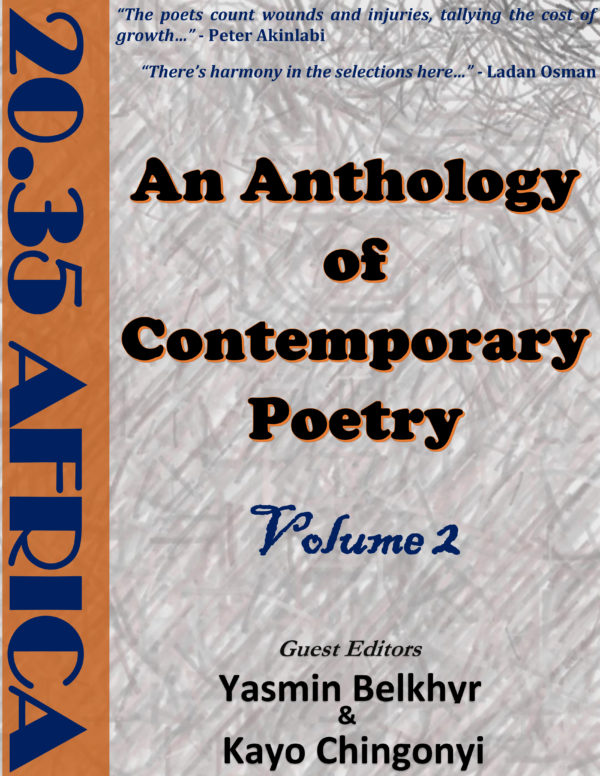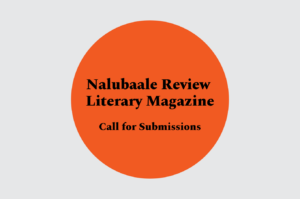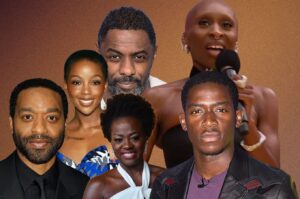
In producing this anthology, there were challenges we had not foreseen, mostly because the individuals involved lived in different continents and time zones. Wile it has been exhausting, we have also experienced that rewarding joy of pulling off a difficult task. This year, we worked with 30 contributors, Yasmin Belkhyr and Kayo Chigonyi as guest editors, Ladan Osman and Peter Akinlabi who wrote the sincere blurbs, and a handful of media platforms, all of whom we the 20.35 Africa team are eternally grateful to. It is humbling to occupy a central place in this communion of efforts, to be offered the privileged position of witnessing contemporary African poetry through this raw lens.
While the poems in this anthology vary in subject-matter, they are connected by common attitudes in contemporary African poetry: they take off from the personal and consider the historical, the traditional, the national, and the communal through their relatedness to the self. Memory and longing are central in the poems by a number of diaspora poets; whether it is Nadra Mabrouk asking—Why does the flailing figure still remember / the water that once held it safe, only to push it away?—or Oubah Osman declaring that Each memory is a ruin in a poem filled with remembering, or Emmanuel Oppong-Yeboah rewinding to the lore and history of his home country Ghana, or Oyin Olalekan who asks bluntly—In the car we argue about the state of Nigerian politics: / How come no-one ever goes back? / Why can’t I go home and build?—the presence of the word “remember” ties these poets up in one immutable experience. This remembering is done not as an ideal act but one that is compelled by necessity.
The home-based poets speak of hostilities domiciled. Hauwa Shaffi Nuhu proffers how the human body can bear the consequences of a disastrous home: actually, it is me who’s / the aftermath of war / my name is new & used – / butchered at the edges, keeping the fate / of its real owner away. For Ianne and Maneo Refiloe Mohale, the personae faces the dangers of both macro and micro aggressions, sponsored by social hatred of difference in Ianne and of queer love in Maneo. The elegiac tone persists through Nome Emeka Patrick’s work in which social and political decadence is rendered familial and personal:
in the city of wind, there are bones begging for canopies of flesh, &
this is just another metaphor for the blood & the guns & the fucked govt.
…
every boy i know is walking backwards, threading
their feet back to when we first knelt in gardens to dream of dreams, when
we were running but into our father’s arms, & not into walls of bullets.
For Sinaso Mxakaza, Asisipho Shaun Burwana, and Kondwa Rayne, the persistent feminine body is in multiple forms; sometimes weary, sometimes defiant, other times as fragile as china.
Other poets withdraw from this heated space into meditation, whether religious or existential. In this regard, Megan Ross does not merely deify motherhood in her poem, she engages a re-presentation of what is central in divinity—creation, providence, and nurture—and injects it into motherhood. In one of her poems, God’s essence, orthodoxy, and mystery are dissolved into a new understanding in which they begin to function as human and primarily woman. In the same meditative spectrum, Goodness Olanrewaju Ayoola resembles Saddiq Dzukogi, not only in the brevity of their poetry but in their dreamscape.
Never in the history of African poetry has it been as self-indulgent as it is now—which we can all agree is a productive liberty. The contemporary poet often writes from a personal place, choosing to not be demure with what is private. In her purely romantic poem, Ugochi Okafor does not care for a cause, she makes sexual desire as legitimate and significant as other topics:
I want these:
your hands on me,
your tongue searching my mouth,
your whispers fondling my ear,
your chuckle falling into my heart
with every playful shoulder bite,
your moans escaping like fireworks
when my fingers draw patterns on your soft spot.
These poets are also writing in the most affective language. Part of what is remarkable in these poems is that the lines that are beautiful in themselves. Goodness: God’s / Quietness is a thousand times louder than loudest; Jeremiah: our love / of height, not the longing for gods, built a tower; and Ekpenyong:
I do not wear pain like some people do
I spill it off me and wear a nice face
So my painter will learn a thing or two about mistakes;
We were not seeking to publish an anthology of the best contemporary African poetry; we were seeking poems that most sincerely engage their subject-matter while holding strong artistic merit. The 30 poems we have selected here combine these principles and are in themselves multiple conversations on the sensibilities of being African in a modern, global system.
ABOUT THE EDITOR
Ebenezer Agu is Editor-in-Chief of 20.35 Africa: An Anthology of Contemporary Poetry and Poetry Editor at 14: Queer Art. He writes poetry and every other form of prose that isn’t fiction.









COMMENTS -
Reader Interactions